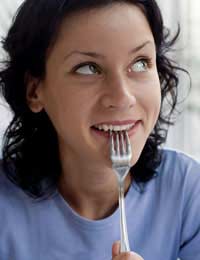ADHD and Over-eating

Sufferers of Attention Deficit Hyperactivity Disorder or ADHD will experience considerable emotional distress as a consequence of low self-esteem and self worth, social isolation and frustration. These outcomes of the disorder are well documented and well known. What is also very well recognised is the tendency of adults with ADHD to suffer from depressive symptoms, and to then take comfort from a range of 'self-medicating' activities.
Over-eating is one typical 'comforting' behaviour of adults with ADHD. Like the look of that Mars bar? It is eaten before any consideration of the consequences. Excessive snacking will be exacerbated by a lack of impulse control, which is a common problem in hyperactivity-impulsivity ADHD.
A first step to solving the problem of over-eating is to understand how ADHD can affect eating patterns, so that an affected person can stop blaming themselves and can be in state of mind to start regaining control of their appetite.
How Over Eating Patterns can Become Established
People with attention deficit disorder are likely to already have a low self-esteem as a consequence of their condition, and these feelings are made worse by over-eating and bingeing. Binge eating and general over-eating seem to happen most often when an ADHD sufferer is bored or not getting sufficient stimulation from their lives. People who have ADHD need higher levels of mental stimulation to help them feel focused and balanced. A lack of stimulation, adequate leisure activities or day-to-day mental challenges can easily lead to feelings of being irritable and depressed which can be temporarily relieved by eating.One of the principle symptoms of ADHD is a loss of control of impulsive behaviour, so eating of many snacks and sweets can easily occur on impulse over the course of a single day. Another major factor is that when someone with ADHD is completely preoccupied with another activity, they will frequently forget to eat.
Because of a reduced awareness of hunger signals, sufferers forget to eat until their hunger builds up to an extreme level over the course of the day. By the time they remember to eat, the need is urgent and an ADHD sufferer may become ravenously hungry. Over-eating follows, and any control over portion sizes is completely ignored. Additionally, the feeling of 'being full' is likely to be ignored, so that a sufferer will continue eating long after they should have stopped. As a consequence of these dietary patterns, obesity may well follow.
Whilst medication can help with many of the symptoms of this disorder, it does not appear to have a significant effect on helping to address poor eating patterns, which can include Bulimia and binge eating. This may in part be due to the fact that ADHD goes undiagnosed until adulthood in many individuals with significant over eating problems, and by the time that the condition is recognised, obesity and poor dietary patterns may have already become established.
Things to Do to Establish Healthy Eating Patterns in ADHD
- Identify which situations and patterns are associated with a loss of control over food intake
- Plan meals and stick to the timetable regardless of whether you are hungry or not
- Make sure that portion sizes are kept to a correct size
- Avoid dieting - a lack of impulse control means that you are likely to fail
- Set an alarm to remind you to eat at the appointed times
- Keep your day full of activities to keep your mind stimulated, and avoid boredom
- Misdiagnosis Controversy of ADHD
- Cigarette Smoke and ADHD
- Western Diet and ADHD
- Pre-Natal Links to ADHD
- Tobacco and Lead Exposure in ADHD
- Can Pesticides Increase ADHD Risk?
- Inside the ADHD Brain
- How Sleep Influences ADHD
- Is ADHD a Genuine Condition?
- Evidence Review: ADHD & Scientific Research
- ADHD and Asthma
- ADHD Hyperactivity or Food Allergy?
- ADHD and Dyslexia
- Is ADHD Hereditary?
- ADHD and Aspergers Syndrome
- Possible Causes of ADHD
- The Difference Between Bad Behaviour and ADHD
- Tests for ADHD
- ADHD Signs & Traits
- ADHD: Symptoms and Diagnosis
- What is ADHD?


Re: Inside the ADHD Brain
This was really helpful! Recommend reading.
Re: Distinguishing Between ADHD and the Bright Child
A person with ADHD can show hyper focus on something that interests them, when they are in their "flow",…
Re: Conquering ADHD
I was told by my daughter Peditrishion that I could get help with my 9 year old daughter's behaviour she was referring me to somboadys else on…
Re: Why Do Some Teenagers With ADHD Self Harm?
I was born with ADHD and Iam now 17 year old adolescent.I suffer still with that problem and I am vulnerable to…
Re: Is ADHD Hereditary?
Dear coach4learn: The views you seem to be projecting are a blatant disregard towards the obvious truth regarding attention…
Re: ADHD in Adults
Stumbled upon this. Not really computer literate. You are describing me. What I hate most is my wife continually shouting at me that I "just don't…
Re: ADHD and Dyslexia
Jackie - Your Question:My son has is 8 years old now and can hardly read. He does not read. It seems as if he is struggling to get the alphabet…
Re: ADHD and Dyslexia
My son has is 8 years old now and can hardly read. He does not read. It seems as if he is struggling to get the alphabet in "his head". His…
Re: ADHD in Adults
My son has had problems since he was born but never diagnosed he has been in lots of trouble with the authorities and broken relationships. He self…
Re: The Difference Between Bad Behaviour and ADHD
i have 13yr old son, he has been diagnosed adhd since age 7yr. old until now we keep on visiting his doctor.…